Brad Nailer vs. Finish Nailer: Which is Better for You?
A nailer is one of the most popular power tools among woodworkers and DIYers. And it is one of those power tools that you must have in the workshop since you will need it for almost all your projects.
However, picking between the various types can be a little tedious. One of the tough choices you might need to make is whether to go for a brad or finish nailer.
The physical appearance of the two handy power tools is quite similar, and the fasteners that they use are also quite similar to some extent. And what this means is that many woodworkers will have a hard time deciding what to buy.
It is possible to buy a combo kit and get a variety of nailers at a go. But if you have to get either a brad or finish nail the vital thing is to make sure that you understand the capabilities and shortcomings of each tool.
| Product Photo | Product Name | Rating | Price |
|---|---|---|---|
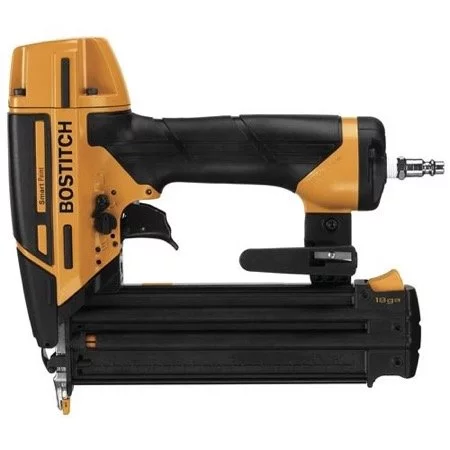 | 1. Bostitch BTFP12233 Smart Point 18GA Brad Nailer Kit | 4.5 | |
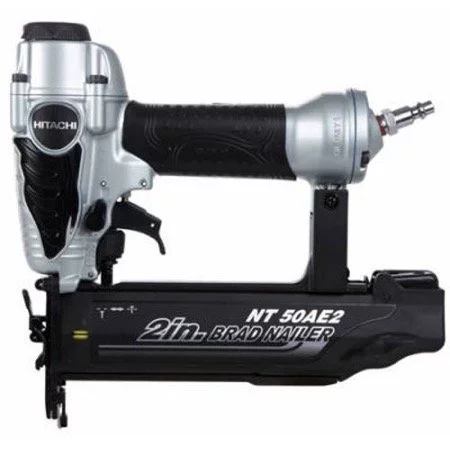 | 2. Hitachi NT50AE2 18-Gauge Brad Nailer | 4.0 | |
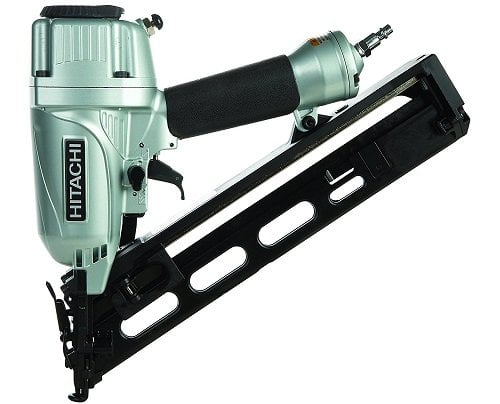 | 3. Hitachi NT65MA4 Angled Finish Nailer | 4.4 | |
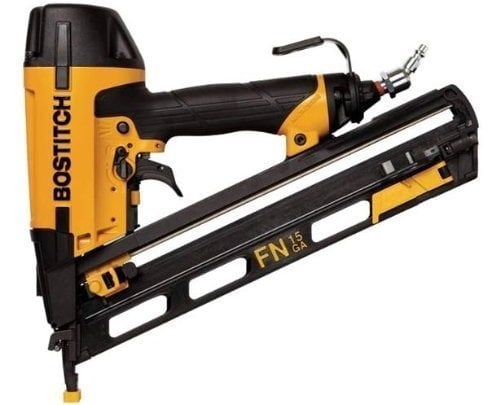 | 4. Bostitch N62FNK-2 Angled Finish Nailer | 4.5 |
Brad Nailer
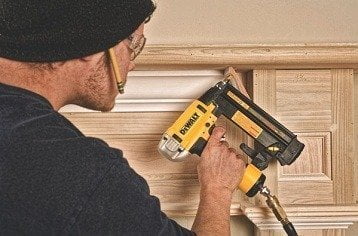
When doing some finish carpentry, there is always that one tool that you turn to when you want to finish some trim or cabinets. And for many woodworkers, it is the brad nailer as it is versatile and there is almost no finishing task that is too much for this nailer.
The brad nailer gets its name from the fact that it shoots small brads which in most cases are 18-gauge but can be between 5/8 and 2- 1/2 inches long.
Brads are relatively thin if you compare them to the 16 or 15 gauge ones that you will get on the regular finish nailer, and they do not leave large holes on the workpiece. And in most cases, you will not need to use a lot of wood putty to fill them.
The small gauge of the brad nails also means that unlike the finish nailer that use larger fasteners you will not have to worry about issues like splitting wood when dealing with delicate materials.
Brad nailers will be ideal for various finish carpentry applications. You can also use the nailer to hold two pieces of wood together as the glue dries and then remove the nails with pliers later on.
Overall, the brad nailer will be ideal for adding finishing touches to your woodworking project and attaching molding or trim. Also, you can use this nailer for a variety of household projects and renovations, repairs and crafts.
Read More: Brad Nailer vs. Pin Nailer
Pros
- Relatively small nail holes. With the brad nailer, your workpieces will end up with relatively tiny nail holes compared to what you get when using the finish nailer. And this is thanks to the thin gauge nails. In most cases, a woodworker will only need to use little to no wood putty to fill the holes.
- Will not split wood. The thin gauge of the nails also means that the brad nailer is less like to split wood and this is still the case when dealing with delicate trims. With the large gauge nails on the finish nailer, damaged workpieces are a common problem that you might encounter, and this is more so when working with thin and delicate wood pieces.
- Handy when gluing pieces. You can use the brad nailer to apply pressure to two wood pieces as the glue dries. What makes it ideal for this is that the thin gauge nails will not leave any significant holes in the workpiece. And you can also remove them later on with pliers easily. The 18-gauge nails will not cause any damage to the wooden surface.
- Best for narrow trim and molding. The 18-gauge brad nails are thinner in cross-section than the 14 to 16-gauge finish nails. And so brad nails will be the best for finishing narrow trim and molding as they are more unlikely to split these delicate pieces. What this also means is that brad nailers are the best for baseboard shoe molding or stop and cove moldings.
Cons
- Not ideal for large pieces. One of the significant drawbacks of the brad nailer is that the fasteners will not go through woods such as MDF and thick plywood. And neither will they go through walls. When dealing with large wood pieces, the finish nailer is way much better as they shoot stronger nails than the thin 18-gauge brads.
Finish Nailer
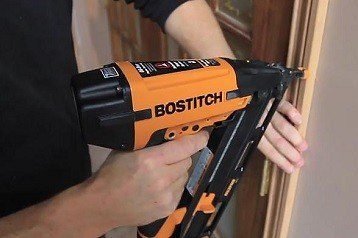
While the brad nailer will be very handy when you need to finish some delicate wood pieces or hold them together as the glue sets, they still do not provide enough holding power. When you need a lot of holding power for your project the finish nailer is the appropriate tool to use.
Finish nailer will accommodate nails with a gauge of between 14 and 16, and they are in most instances 1 to 2.5 inches long.
The nails that this nailer uses are often bigger than what you get on the brad nailer and they will disappear into the wood to provide a good finish that you can paint over with ease.
Although the finish nailer will leave more massive holes than the brad nailers, you can take care of them with some wood putty.
And besides, from providing higher holding power, these nailers are also ideal for use when attaching heavy or large pieces baseboards, cabinetry and wide crown molding. When using a brad nailer, all of this can be hard to achieve.
Pros
- More holding power. The large and longer nails that the finish nailers will shoot will provide more holding power than what you get from the brad nailer. These non-removable fasteners are not just for holding the pieces together as they dry but for attaching them permanently.
- Best for heavy trims. You can use the finish nailer to attach heavy trims and larger pieces of wood which might not be possible with a brad nailer. Whether you are working with baseboards, crown moldings or cabinetry, this will be a handy nailer for you. Brad nailers are not likely to hold these materials together for long and so they will not be helpful for attaching them.
- Highly versatile. When comparing the finish nailer to the brad nailer, you will find that it is a more versatile power tool. You can use it to attach a variety of materials from baseboard to MDF and plywood. Also, it will also be handy when you need to mount either of them to a variety of surfaces from wood to drywall and plaster.
Cons
- Not ideal for delicate trim/wood. The last thing that you need when finishing a project is getting split or damaged wood and having to replace the pieces. When working with delicate trim and wood pieces, this is a likely situation if you use the finish nailer due to the large fasteners and so a brad nailer is always the better option for your thin pieces.
- Holes require filling. Although the nails on the finish nailer will disappear into the wood surface, they will still leave significant nail holes that need filling. And so it is almost inevitable to use wood putty to fill them which takes time and more resources.
The Bottom Line
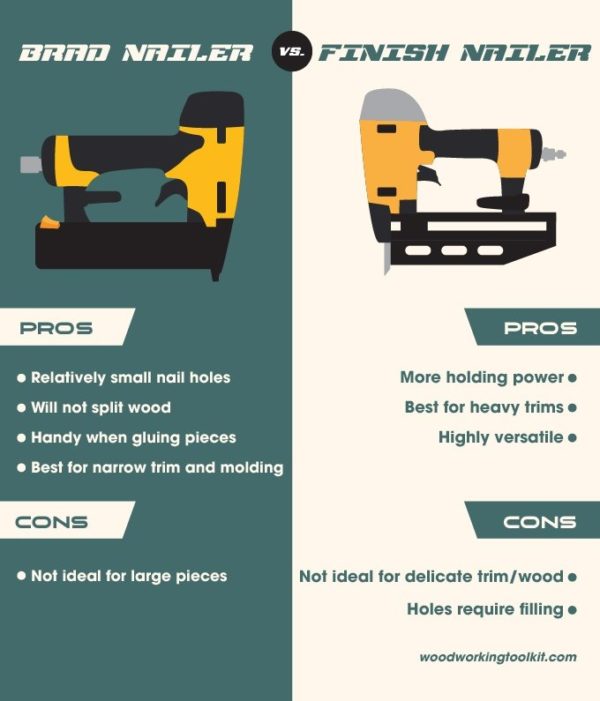
If you can afford it, the right idea is always to buy a combo kit that allows you to get various kinds of finish carpentry nailers at a go.
But, in most cases, many woodworkers will prefer to get one first. And when this is the case, and you have to pick between the brad and finish nailers the wise idea is to buy what you think you will need to use most.
If you work with delicate trims and wood pieces a lot, the brad nailer is the best choice because finish nailers can split them. Also, if you just want something to attach wood pieces as the glue dries the brad nailer is also the right choice.
For woodworkers looking for a more versatile nailer that you can use for a variety of materials and also provides a lot of holding power the finish nailer is a must-have.
Finish nailers are also the right pick for those that work with more massive materials and also want a nailer than they can use for more than just finishing.
Best Brad Nailers
1. Bostitch BTFP12233 Smart Point 18GA Brad Nailer Kit
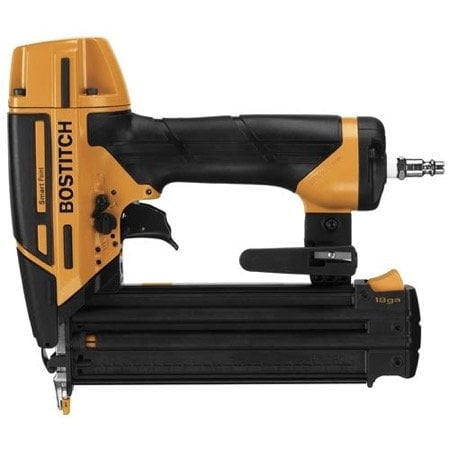
Bostitch BTFP12233 is an efficient and reliable brad nailer that will be a great power tool to have for your projects. And it features smart point technology that will make it easy for users to place the nails without the need for contact trip.
Like most other brad nailers, it drives 18-gauge fasteners, and they can be as long as 2-1/8 inches to make them suitable for various applications.
This power tool also uses a tool-free jam release mechanism that makes it easy to clear jams, and there is also a dial-a-depth control knob to make it easy to determine how far you drive the nails.
The oil-free operation of this brad nailer eliminates the risk of staining the work surface, and it also features an adjustable belt hook for convenient carry. And there are also some other extras like sample fasteners, carrying case and integrated pencil sharpener.
2. Hitachi NT50AE2 18-Gauge Brad Nailer
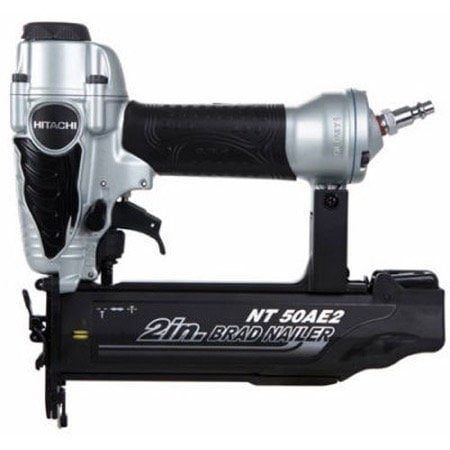
With the Hitachi NT50AE2, you will have a powerful tool that fulfills all your brad nailer needs, and it is also comfortable to use.
The comfort and ease of use come from the fact that it uses an elastomer grip that makes it convenient to hold for extended periods. Also, the tool-free jam clearing adds to the convenience.
The selective actuation is also an excellent feature as it will allow woodworkers to pick from two fire modes depending on the application. And at a total weight of just 2.2 pounds, it is also a lightweight nailer that feels well-balanced for use even all day long.
Adjusting the drive depth of the fasteners should also not be a problem when using this brad nailer thanks to the depth-of-drive dial.
Best Finish Nailers
1. Hitachi NT65MA4 Angled Finish Nailer

For woodworkers on the hunt for a finish nailer that will be handy with everything from installing crown moldings to finishing exterior trim, the Hitachi NT65MA4 is just perfect.
This finishing nailer also features selective actuation that makes it possible to pick between contact and sequential nailing for more convenience and to make it ideal for various projects.
It comes with an integrated duster that you can use to clear dust away from the surface before you start nailing. And it also has a 360-degree adjustable exhaust for directing debris and oil away from the work surface.
The finish nailer is also angled for accessing tight spaces, and the design of the nose makes it easy to clear the jams and without having to use any tools.
2. Bostitch N62FNK-2 Angled Finish Nailer

The angled Bostitch N62FNK-2 makes it possible to drive nails even into the tightest spaces. But, besides from this, there are also many other features that make this a top-notch finish nailer.
These other features include adjustable depth control that lets you determine how far you want the nails to go. And the magazine is easy to remove for reloading without using any tools.
With this finish nailer, you can adjust the nail depth to suit a variety of materials, and it also comes in a lightweight and durable magnesium housing that ensures that it will serve you for long.
And besides, from the lightweight and durable construction, this finish nailer also includes four profile tips to make it even more convenient and versatile.
Last Updated on August 18, 2020 by
